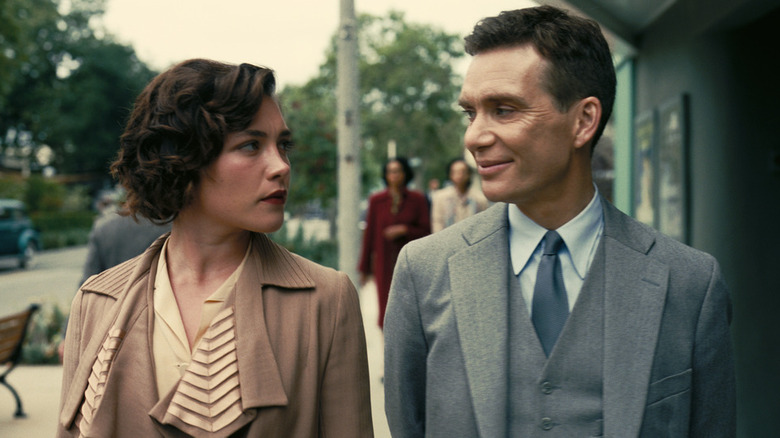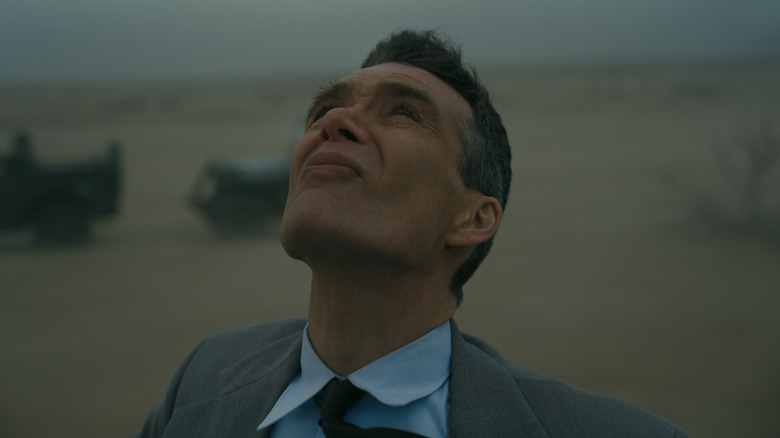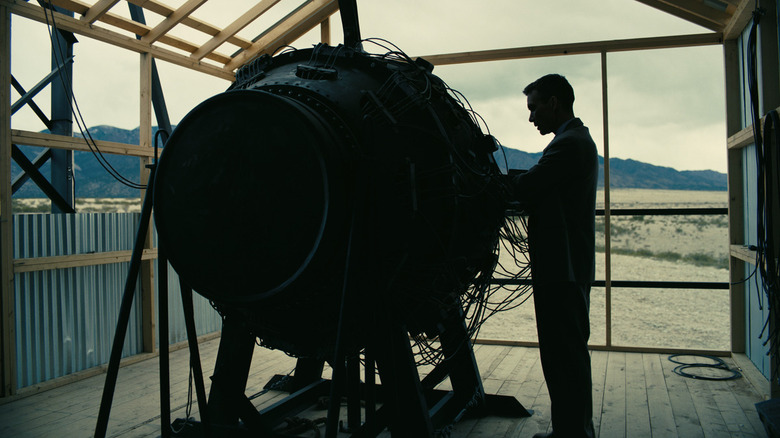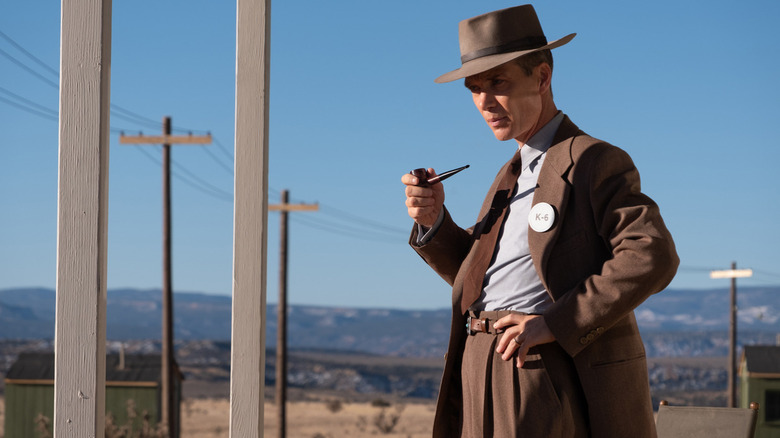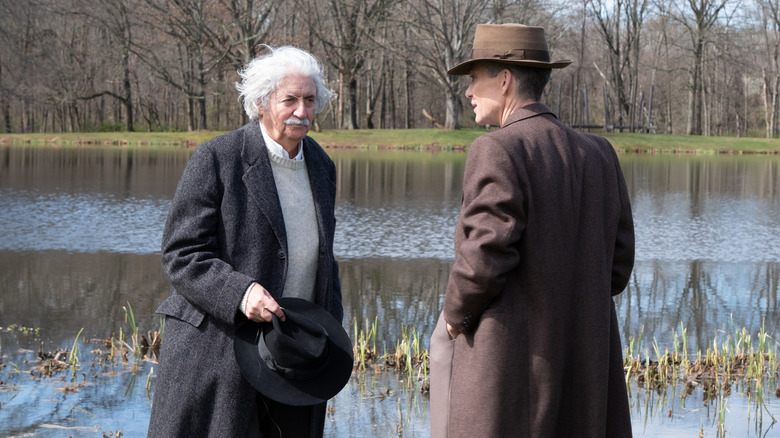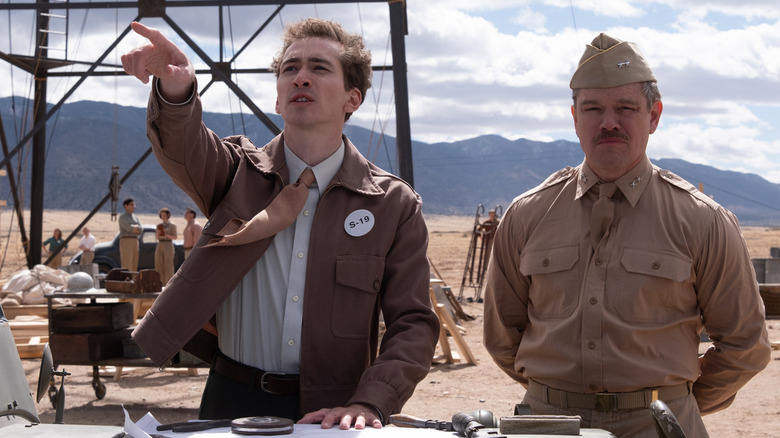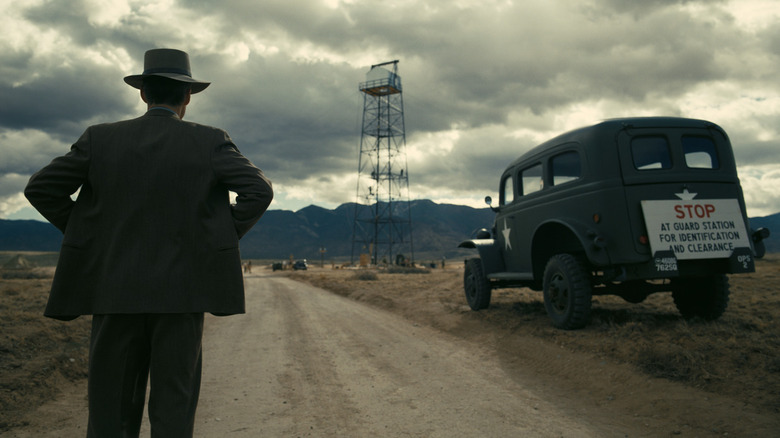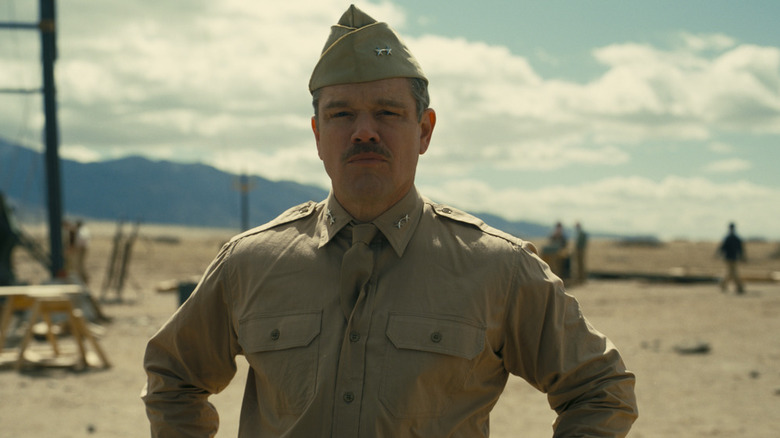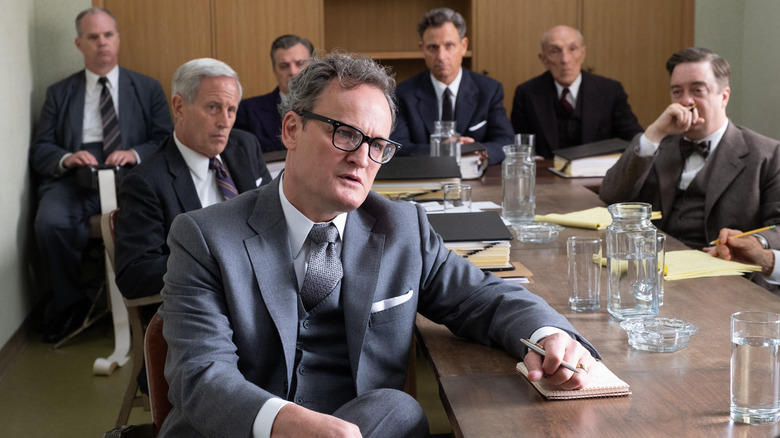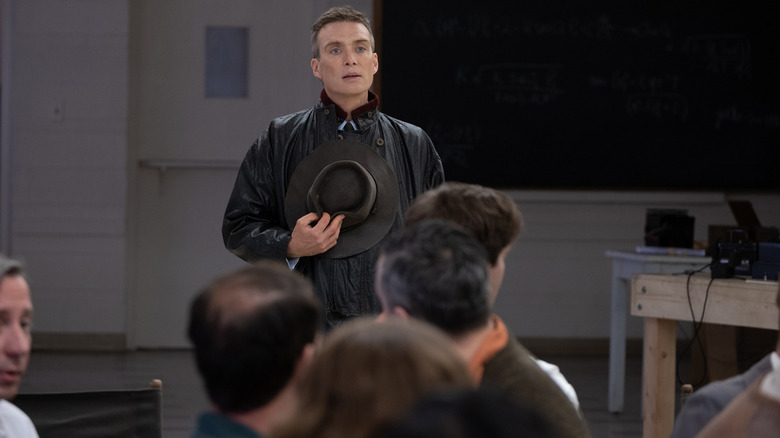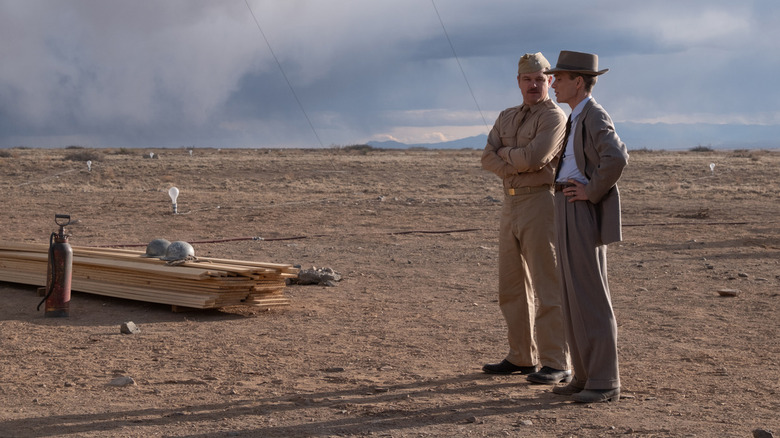Things Oppenheimer Didn't Tell You About The Real Story
Christopher Nolan's epic biopic "Oppenheimer" tells the story of J. Robert Oppenheimer — the so-called "Father of the Atomic Bomb" — and the complicated place he occupies in history. The eponymous character is brought to life by frequent Nolan collaborator Cillian Murphy, giving us an in-depth look at a deeply conflicted man. In the film, Oppenheimer was a brilliant and driven theoretical physicist who was instrumental in developing the nuclear weapons that helped the Allies win WWII, saving countless American lives in the process. Despite being lauded as a hero, he was plagued by the fact that he gave the world the power to destroy itself, and his efforts to warn the masses of the dangers of nuclear proliferation made him a pariah in the country he helped save.
Nolan's attention to detail resulted in a film that's quite faithful to the historical events it's based on. However, even with a hefty three-hour runtime, "Oppenheimer" left out quite a few details about the real-life "Father of the Atomic Bomb." As deep as the movie burrows into what really drove such a layered figure, it still only scratched the surface of a man that we will probably never fully understand. Let's take a look at some of the truths that "Oppenheimer" didn't tell you.
His early life
The earliest part of J. Robert Oppenheimer's life that we see in the film are his college days. What the film doesn't tell you is that he was born on April 22, 1904, in New York City to German Jewish parents. Because of his work in the textiles industry, Julius Oppenheimer and his wife, Ella, were quite wealthy, which meant that their son had a comfortable upbringing; the family resided in a spacious Upper West Side apartment adorned with art, and employed three maids and a chauffeur.
Even though he had an affluent home life, however, Oppenheimer had a humble, even charitable personality, never letting his family's wealth ruin his inherent modesty. According to Kai Bird and Martin J. Sherwin's biography "American Prometheus," Oppenheimer's school friend Jane Didisheim described him as "very frail, very pink-cheeked, very shy." Of course, even at this young age, Oppenheimer's genius was evident to those who knew him. Didisheim said that, "very quickly everybody admitted that he was different from all the others and superior." Little did Didisheim realize just how "superior" Oppenheimer truly was.
He was a precocious child
At an age that most of us are preoccupied with playing video games and getting in trouble at school, J. Robert Oppenheimer was cultivating an intellect that far exceeded his years. When he was only 9, he was not only reading philosophy – he was reading it in two other languages. Mineralogy was another academic obsession for him, and he became so knowledgeable of the subject that he was invited to give a lecture on it by the New York Mineralogical Club when they mistook the letters he sent to them as being written by an adult.
As expected, his unusually mature scholarly pursuits meant that the young Oppenheimer didn't easily fit in with other children his own age, and he was often the target of mockery. Of course, he knew how smart he was, which may have given him an arrogance that didn't sit well with others. "American Prometheus" states that Oppenheimer once claimed, "I repaid my parents' confidence in me by developing an unpleasant ego, which I am sure must have affronted both children and adults who were unfortunate enough to come into contact with me." While his superior intellect carried him far in life, it also did little for his mental health.
He experienced mental health problems
"Oppenheimer" hints at the various issues that haunted its subject, particularly upon his realization that he gave the world a weapon that he couldn't take back. However, the film glosses over many of the particular demons that J. Robert Oppenheimer wrestled with throughout his life.
Oppenheimer's graduate studies at Cambridge's Cavendish Laboratory were a difficult time for him. His perceived ineptitude in a lab setting pushed him into a state of despair so severe that he had regular thoughts of suicide. His unfulfilled ambitions during this time apparently drove him to poison the apple of his professor Patrick Blackett. (This incident is featured in the film, but it differs quite a bit from the real story. Like in "Oppenheimer," Blackett did not consume the apple, but Oppenheimer did confess his crime, though his only punishment was a suspension.) It's generally believed that Oppenheimer's attempt to poison his superior was motivated by his extreme insecurity about his abilities as an aspiring scientist.
Oppenheimer's fragile mental state during this time also drove him to nearly kill Francis Fergusson, one of the few friends he had. Upon learning that Fergusson was engaged, Oppenheimer "jumped on me from behind with a trunk strap and wound it around my neck... I managed to pull aside and he fell on the ground weeping," Fergusson recalls, according to "American Prometheus."
If you or someone you know is struggling or in crisis, help is available. Call or text 988 or chat 988lifeline.org
He had a deep love of literature
Other than a fascination with Vyasa's "Bhagavad Gita," the film doesn't reveal much about the real J. Robert Oppenheimer's considerable passion for classic literature.
His time in graduate school may have been plagued by a variety of mental problems, but literature was one of the few life preservers for him. "American Prometheus" states that, upon reading Marcel Proust's "A La Recherché du Temps Perdu," Oppenheimer was able to find some comfort in the emotional pain that existence caused him. The young scientist avidly read French poetry as part of his mission to conquer what he called "the serious business of life, which is growing wise." Like so many great minds, Oppenheimer wasn't satisfied with the pursuit of only one interest. No single field was safe from his voracious appetite for knowledge and understanding of humans and the world we occupy.
In fact, Oppenheimer even tried his own hand at writing, dabbling in composing prose in the style of Anton Chekhov, as well as poetry. Not much came out of his own literary efforts (the man himself wrote to his high school English teacher that his writing wasn't "meant or fit for anyone's perusal"), though his poem "Crossing" was published in a 1928 issue of The Hound & Horn, a student-run literary quarterly at Harvard that ran from 1927 to 1934.
Why Albert Einstein wasn't a part of the Manhattan Project
It's been widely assumed that influential scientist Albert Einstein played a major part in the Manhattan Project. While "Oppenheimer" depicts that he had only a tenuous connection to the operation, it doesn't fully reveal how he was actually tied to it nor the reasons why he wasn't as involved in it as many people think.
Einstein once claimed (via the American Museum of Natural History) that, "I do not consider myself the father of the release of atomic energy. My part in it was quite indirect." This is correct, though he may have had a role in the U.S. government deciding to utilize this powerful force during WWII when he wrote a letter to President Roosevelt in 1939 stressing the importance of building a nuclear weapon before the Nazis did. According to Newsweek (via Business Insider), however, Einstein expressed remorse for his action, stating that "had I known that the Germans would not succeed in developing an atomic bomb, I would have done nothing."
But considering Einstein's massive contributions to theoretical physics, one would think the famed scientist would've at least been approached to join the Manhattan Project. This did not happen, as U.S. Army Intelligence believed that his leftist political views made him a threat to America's interests, and so he was denied the security clearance necessary to participate in the operation.
The Manhattan Project began as a low-priority operation
"Oppenheimer" depicts the Manhattan Project as a massive operation that spanned the United States, required the efforts of thousands of people, and ultimately cost more than $2 billion.
This is all fairly accurate in terms of how it ended up, but the film glosses over how humble the origins of the Manhattan Project actually were. Officially starting in 1942, the U.S. government provided a paltry $6,000 for the relatively small group of scientists in their efforts to harness the power of the fission process. It's clear that there wasn't much faith in the project at first.
However, as the Nazis grew closer to building a nuclear weapon of their own, the urgency for the U.S. to beat them to the punch dramatically increased, and so too did their funds. In fact, the amount of money set aside for the Manhattan Project increased so much that the War Department hid the total amount from Congress. Development of atomic weapons was the second most expensive military operation of WWII, with only the B-29 Superfortress bomber beating it. Considering how important nuclear weapons would be in ending the war, the U.S. government spared no expense in their creation.
The meaning behind the name Trinity
The detonation test of the very first atom bomb — codenamed "Trinity" — is depicted with great intensity and gravitas in "Oppenheimer," and is one of the standout scenes in the film. However, while references are made to the codename, the explanation behind it is never given.
Funnily enough, the reason for the name was a bit of a mystery to J. Robert Oppenheimer himself. Almost 20 years after the fateful test, Gen. Leslie Groves wrote a letter to Oppenheimer asking about why he chose to name it "Trinity," to which he replied (via the Los Alamos National Laboratory): "Why I chose the name is not clear, but I know what thoughts were in my mind. There is a poem of John Donne, written just before his death, which I know and love." He followed this up with a quote from said poem, "Hymn to God, My God, in My Sickness," though he acknowledges that he still doesn't fully know the connection between this particular sonnet and the name he bestowed upon the detonation.
Oppenheimer had a deep love for classic literature, so it's little wonder that he would turn to poetry for inspiration in his scientific endeavors. However, how and why this specific poem spoke to him when testing a weapon of such immense power is anybody's guess. Perhaps he saw a connection between his story and that of a man facing death, ready to accept an eternity in the heavens.
The real tragedy of Jean Tatlock
The film explores the complicated relationship between J. Robert Oppenheimer and Jean Tatlock: his multiple marriage proposals to her, the secret affair he had with her while married to Kitty, and how their relationship — because of her communist ties — would be used against him years later.
But Tatlock was more than an on-again, off-again lover for Oppenheimer, and she endured a fate far more tragic than that seen in the movie. You see, there's strong evidence that she was secretly gay or bisexual. While this is no longer taboo nowadays, in the first half of the 20th century, anything straying outside of heterosexuality was extremely frowned upon. Also, she was studying to be a psychiatrist, a field that was still very much under the shadow of Freudian psychology. This is significant, as this school of psychiatry considered homosexuality to be a flaw. Her frustration about her sexuality exacerbated her conflicted feelings about Oppenheimer.
What's worse, these overwhelming feelings may very well have contributed to her tragic death, which is widely presumed to have been suicide. Tatlock's father, upon noticing that she wasn't answering her phone, paid her a visit on January 4, 1944, to check up on her, only to find her dead in her bathtub. But before he called for help, he burned various papers and photographs that, while not confirmed, are widely believed to contain proof of her true sexuality.
If you or someone you know is struggling or in crisis, help is available. Call or text 988 or chat 988lifeline.org
Oppenheimer's work on the bomb kicked off a media debate
In the film, the debate surrounding nuclear proliferation is largely confined to the security hearings in the 1950s. However, the debate actually began right after the U.S. demonstrated its might on Hiroshima and Nagasaki, in a fascinating war of words and moving images.
J. Robert Oppenheimer and the destructive power of nuclear weapons were presented to a much larger audience in 1946 in the short documentary "Atomic Power," which features the man himself in a recreation of him and his peers watching the Trinity test take place. This was followed by the New Yorker article "Hiroshima," wherein John Hersey wrote, "It would be impossible to say what horrors were embedded in the minds of the children who lived through the day of the bombing in Hiroshima."
Not to be outdone, President Harry S. Truman convinced former Secretary of War Henry Lewis Stimson to retaliate with an article of his own for Harper's magazine aptly called "The decision to use the atomic bomb." But that wasn't the only weapon in the arsenal of the bomb's supporters; Truman and General Leslie Groves demanded that the script for the 1947 film "The Beginning or the End" – a dramatization of the creation of the Manhattan Project — put as positive a spin on the bomb's use as possible, essentially turning it into propaganda.
Life after the security hearings
The primary aspects of J. Robert Oppenheimer's later years depicted in the film are the hearings that ultimately led to him being denied his security clearance. And while "Oppenheimer" ends with some details about how his reputation was recovered to some extent toward the end of his life, we are largely left with the impression that the remainder of his career was sidelined by bureaucratic vengeance fueled by the Red Scare of the 1950s.
It's true that the denial of his security clearance greatly hindered his various endeavors, but that doesn't mean that he didn't keep himself busy with a variety of important projects. One of the most notable was the founding of the World Academy of Art & Science in 1960, which included help from other influential thinkers like Albert Einstein and Bertrand Russell. According to the WAAS, it "serves as a forum for reflective scientists, artists, and scholars dedicated to addressing the pressing challenges confronting humanity today independent of political boundaries or limits, whether spiritual or physical." Considering Oppenheimer's passion for both science and the arts, the WAAS is a fitting way to immortalize his legacy.
He threatened to sue a playwright who wrote a play about him
Well after the 1954 hearings had stripped him of his security clearance, J. Robert Oppenheimer still had to contend with the ghost of the intense interrogations that kneecapped his career. However, this ghost haunted him in a surprising form: a play.
In the 1960s, German playwright Heinar Kipphardt wrote "In the Matter of J. Robert Oppenheimer," which used the transcripts from said hearings as inspiration. Oppenheimer pointed out numerous ways in which the play distorted the facts of what really happened, such as the way it portrayed Niels Bohr's reaction to the Manhattan Project, and its allegation that Oppenheimer had severe misgivings about working on an atomic bomb. According to Time, Oppenheimer wrote a letter to Kipphardt threatening him with a lawsuit, writing that "you may well have forgotten Guernica, Dachau, Coventry, Belsen, Warsaw, Dresden and Tokyo. I have not."
Still, while one can't blame the physicist for being upset about his portrayal in a play about a bleak time in his life, does that mean great art still can't come of it? "In the Matter of J. Robert Oppenheimer" has continued to be performed long after his death, with a 2006 New York Times review declaring that "the proceedings do seem to lag at times in this relatively long evening of theater (roughly 2 hours 45 minutes). But so what? This is a play of real ideas, posing questions about moral relativism, the limits of vigilance and human decency."
Oppenheimer's death and legacy
Following WWII, J. Robert Oppenheimer was the director of Princeton's Institute for Advanced Study, a post he held until he retired in 1966. The following year, he passed away on February 18 from throat cancer, no doubt brought on by his years as a smoker.
But while he was taken from us in 1967, his legacy continued to live on in a variety of ways, and has undergone numerous reevaluations. For example, on December 16, 2022, Secretary Jennifer M. Granholm of the Department of Energy officially reversed the decision of the hearings that stripped Oppenheimer of his security clearance, stating that, "As time has passed, more evidence has come to light of the bias and unfairness of the process that Dr. Oppenheimer was subjected to while the evidence of his loyalty and love of country have only been further affirmed." While it has taken far too long for this grave injustice to be rectified, at least Oppenheimer's patriotism has finally been recognized.

